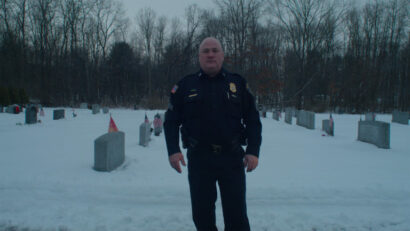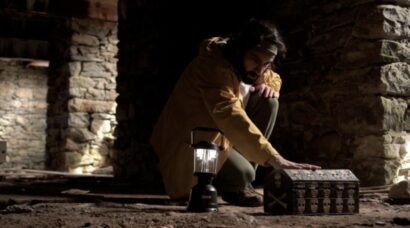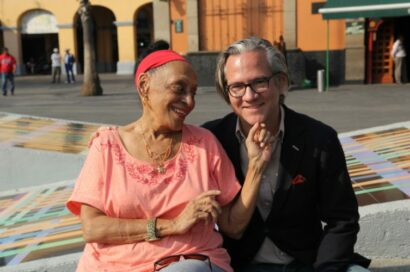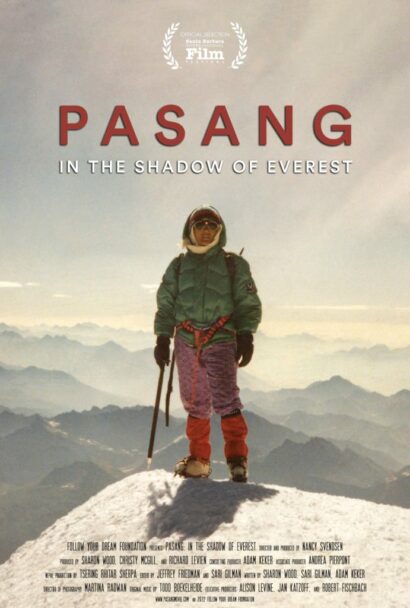A continuation of our conversation with BIFF’s 2022 filmmakers. Part II focuses on BIFF alums and local filmmakers.
Read the original article here.
POSTED ON
One of BIFF’s signature achievements after 16 years of curation and exhibition is surely the support, encouragement and validation it has given to Berkshire filmmakers and others who have passed through its screening rooms as invitees. In a hyper-commercialized world that deifies celebrity, often at the cost of originality and new work, support for local, independent, grassroots filmmakers has remained a priority for Kelley Vickery and her selections team.

A still from “The Backpack.” Photo courtesy of Paige Storti
Paige Storti, whose short documentary The Backpack screens as part of BIFF’s 2022 program, grew up in Great Barrington. Ms. Storti had always been interested in photography, discovering a vast new horizon of possibility when she saw American Beauty in a high school film class: “I fell in love. The symbolism of that film, seeing how many motifs and metaphors were laid throughout, there were ideas behind every choice.”
With an undergraduate background in psychology, Paige was drawn to real life even while studying a medium so often used to conjure fictions and fantasies: “I wanted to do something to help, to bring awareness to actual issues people are facing.” The medium of documentary seemed a perfect fit, and in searching for subject matter, Paige scarcely had to step beyond her own threshold; growing up in Great Barrington, her father Paul had always been on the police force. Today, he is chief. That long and dedicated path of public service did not come without its trials and tribulations. “I was interested in documentaries and watched a film with my dad about loss and how we as humans handle it. While we were watching the film, he broke down and started telling me about everything that had happened to him on the police force over a 30 year career. I’d never seen him like that. Growing up he was always so strong.” “You stuff it in your backpack,” Paige’s father said, referring to his way of dealing with the difficulties he’d experienced on the force. Unwittingly he had also given Paige a perfect title for her film. “I saw him in a new light. I realized, this is actually serious, he should get help and maybe try to help others.”
Making the film was unavoidably intense and personal: “It was an eye-opening experience for me. We had several hours-long interviews. I learned so much about him, things I never knew. It really brought us closer. He actually became chief while we were filming, and I think partly because of the experience of being interviewed and realizing how important this is, he’s now implementing healthcare and mental health programs for first responders.” Paige’s quest to positively impact her world is expanding: she’ll be traveling to the Dominican Republic later this year to begin pre-production on a new film: “I went there before and was really struck by the poverty people are suffering from. It gave me a new perspective and inspired me to tell their stories.”

Daniel Aronskind in a scene from his film “In Ruins.” Photo courtesy of Daniel Aronskind
In preparing to make his first “official” short film, In Ruins, screening at BIFF this year, he thought about what (and who) he knew and loved. “We’ve been family friends with Rudi Bach for many years and I crafted one of the main roles specifically for him.” Rudi, a Berkshires local and man of diverse talents, stars opposite Daniel himself in an intense, psychologically-fraught two-hander: “I was really inspired by The Lighthouse and The Shining. My film is about two men who find themselves living near each other on a remote lake. One of them is a writer struggling to complete his first work, seeking isolation. The other man is an intense figure with strong artistic convictions, who is not necessarily supposed to be there.” Mr. Aronskind laughs when asked whether this film can be seen as a map of his inner psyche, transparently admitting that, indeed, “I do see myself as both sides. There are aspects of both characters which come from me. I found it therapeutic to write, especially after years of lockdown.”For Daniel Aronskind, born in New Jersey and a frequent visitor to the Berkshires throughout the years, a passion for movies was innate. “I’m not formally educated in film, and then during COVID I was able to studiously absorb an enormous number of movies, since there was often nowhere else to go and nothing else to do! I’ve always been interested in film, made shorts, kept writing screenplays through college.”

A scene from “How to Disappear.” Photo courtesy of Ruthie Lee
Tech-savvy, with a background in mechanical engineering and a current position working with data at the megalithic asset management company BlackRock, Daniel made up for a lack of formal film training by figuring it out on his own, all while holding down his highly respectable, full-time job: “Mike Tyson once said, ‘everybody has a plan ’til you get punched in the face’, though planning was everything, because you will get punched in the face and then you’ll be glad you prepared. We had a skeleton crew so it was even more important. I did a lot of research, made a detailed shot list, I did all the camera work and asked a friend to help when I was on screen with Rudi, got another friend to do the score… it’s easier to make a film if everybody is willing to work for free!.” The platform BIFF offers is a real thrill to Daniel, who describes being invited to the festival as a surreal and definitive experience: “I thought it was a joke when I got the acceptance, texting my family about it was the greatest moment of my life thus far. I’ve grown up going to BIFF and seeing movies at the Triplex so I really appreciate this. I’ve never done anything like it.”
Ruthie Lee grew up in the big yellow house at the corner of Cottage Street in Great Barrington and later attended The New School in New York for play writing. “I always loved going to plays and I wanted to write them. We started with the fundamentals of story… it is so easy to write a bad play!” When the pandemic descended on city life, “I was a junior. There was this mass exodus from New York all of a sudden. My entire senior year was online, and it got to the point that I just couldn’t watch another Zoom play. I decided to make a film.”
She began the script for her short film How to Disappear by turning out a 60-page screenplay. Her professor told her to make it 10. “I didn’t want it to feel like a trailer, I want you to know that there’s more to the story but feel happy with where it ends.” The practicalities of film making are always daunting, but Ms. Lee found a way: “I think we’re all under this impression that you need huge crews and lots of money, I had $250, a friend as cinematographer, two friends as actors, and we shot over two freezing, brutal GB nights. I learned I was more adaptable than I thought.”
Her work on the film was so impressive to Ruthie’s play writing professor that he suggested she submit the rough cut to an exclusive lab that is part of The New School’s drama department. “Nobody’s film ever gets in and mine did, as well as my friend’s. I actually won Best Short…. We got into a few other festivals but I’ve always been obsessed and fascinated with BIFF, it’s genuinely a dream come true for me.” As native Berkshirean, this currently Boston-based creative producer and filmmaker is keen to return: “there is so much potential in our county. I know a lot of young people who want to live in the Berkshires but there’s no affordable housing and currently aren’t enough jobs (in the arts or otherwise). In five or 10 years I’d love to be back here producing films.”
Filmmaker and BIFF alumnus Hugo Perez lived and worked in Great Barrington from 1993 to 2000. “I was the activities director for Simon’s Rock,” he recalls, “and after my time in the Berkshires I moved to Brooklyn. In 1996, I ran an academic trip to Cuba to share a bit of my heritage with my students.” Mr. Perez is indeed of Cuban descent, as is the central subject of his new film, starring the eponymous Omara, or Omara Portuondo as she is credited in her first cinematic appearance as part of the “cast” of Buena Vista Social Club, a documentary which remains iconic.

Filmmaker Hugo Perez with his subject, the world-renowned Omara. Photo courtesy of Hugo Perez
“Growing up in Miami it was still the Cold War, we were very aware of the divide, we knew we weren’t supposed to go to Cuba even after ‘89. I was the only person in my immediate family to visit. It was incredibly powerful to see the homes of my family members, and at one point this 100 year-old woman took me by the hand and showed me a patch of dirt, once a small shack, that had been the spot on which my father was born. Literally the exact spot.”
Having pursued film as an undergraduate at Yale, Hugo worked for the New York State Writer’s Institute, and started exploring film. Omara is his fourth as director, sixth as a producer and fifth as editor. This is his first time directing a documentary, and the origins of the project were about as likely as a family crossing from Havana to Miami in a rubber dinghy without running into rough surf. “I had been hired by producers from PBS, partly because of my Cuban heritage, to coordinate a benefit concert in Havana, which Omara was going to headline. I met her and her son to discuss the project, and after securing all permissions and bookings, PBS pulled the plug. Omara had to leave on a touring engagement and I found myself alone with her son in the kitchen of her home. He made us each an espresso and then quite casually asked me, “Hugo, would you like to make a film about Omara?”
The film documents the mature period of an artist and icon with global significance, Hugo comparing it to “making a film about Edith Piaf in her later years. When she sings and expresses her art, it’s like you’re living in a musical.” The film will be near the beginning of its run when it plays this weekend at BIFF, but this is a highlight for Hugo. “I’ve been to many festivals. BIFF is not as market-driven as Sundance or Cannes. It is about being in a beautiful place with a fantastic selection of films, the Berkshires in early summer, it was so exciting to have been present for its inception back in 2006 and to have been here before as a filmmaker. I’m so thrilled to be coming back.”

The theatrical poster for “Pasang: In the Shadow of Everest.” Photo courtesy of Christy McGill
Also a BIFF alum, Christy McGill has produced three documentary features. She made her start in screenwriting but ran up against the writers’ strike in ‘07. “Around then I got into the San Francisco doc scene… in the midst of the strike where nothing was happening, documentary seemed doable!” Her first non-fiction feature as producer, Serenade for Haiti, tells the inspiring story of a music school in the heart of Port-au-Prince, and her second, Ai Weiwei: Yours Truly, chronicles the famed Chinese artist as he remotely creates an art show at Alcatraz prison while under house arrest in Beijing.
For her third picture, Pasang: In the Shadow of Everest, Ms. McGill’s talents were sought out by producer Sharon Wood. “I also knew the director, Nancy Svendsen, and just hopped in with both feet. It’s an amazing team and I feel lucky to help.” The film’s central subject, Pasang Lhamu Sherpa, was the first Nepali woman to summit Mt. Everest. “This is a beautiful film that deeply probes the structural inequalities in Nepal. Pasang changed the country and fulfilled a national destiny. There were more people at her funeral than the King’s”. Her astonishing achievement was tempered with tragedy, as Pasang never made it down from the summit alive. “It’s our feeling that Pasang’s name should be known worldwide, and that Nancy’s film is really about correcting an omission in the record of history.” Pasang is an inspiration to Nepalis, and now her story can touch the world. “We were at Santa Barbara International Film Festival with Pasang’s daughter. Watching her watch the film was incredibly moving and gratifying.” As for the director Nancy Svendsen, this has been a labor of deep love and commitment: “Nancy has been making this film on and off for ten years”, Christy explains with a note of sincere admiration, “I look at her work on this project as a profile in courage. And this is her very first film”.
Christy is enormously grateful for BIFF and its support of independent work: “it’s a very difficult time for indies. BIFF is like a crown jewel, putting a unique focus on the films and their makers. I lived in Williamstown for many years and this area was always crying out for a more permanent home for film, what Kelley and her team have achieved is just fantastic. The filmmaker summit allows us to slow down and be in each other’s company, the festival is perfectly conceived to compliment its setting and you really feel the support from Kelley and her team in a holistic way. BIFF is really rising in filmmakers’ esteem, it’s the kind of event we need as a community”. For her film, the road to the cinematic summit may not be as grueling as the path Pasang forged up Mount Everest, but it has been long and at times uncertain. The validation and support can be hard to find at first, but Christy and her team’s hard work is coming to fruition. Just yesterday, “the film won the prestigious Charlie Fowler Award for Best Adventure Film in Telluride at Mountainfilm. We are so happy about this.” Perhaps Pasang’s fateful ascent may be only the beginning of her journey.
Editor’s Note: BIFF runs from June 2–5. Tickets and passes can be purchased online or by calling the box office at 413-528 8030.
